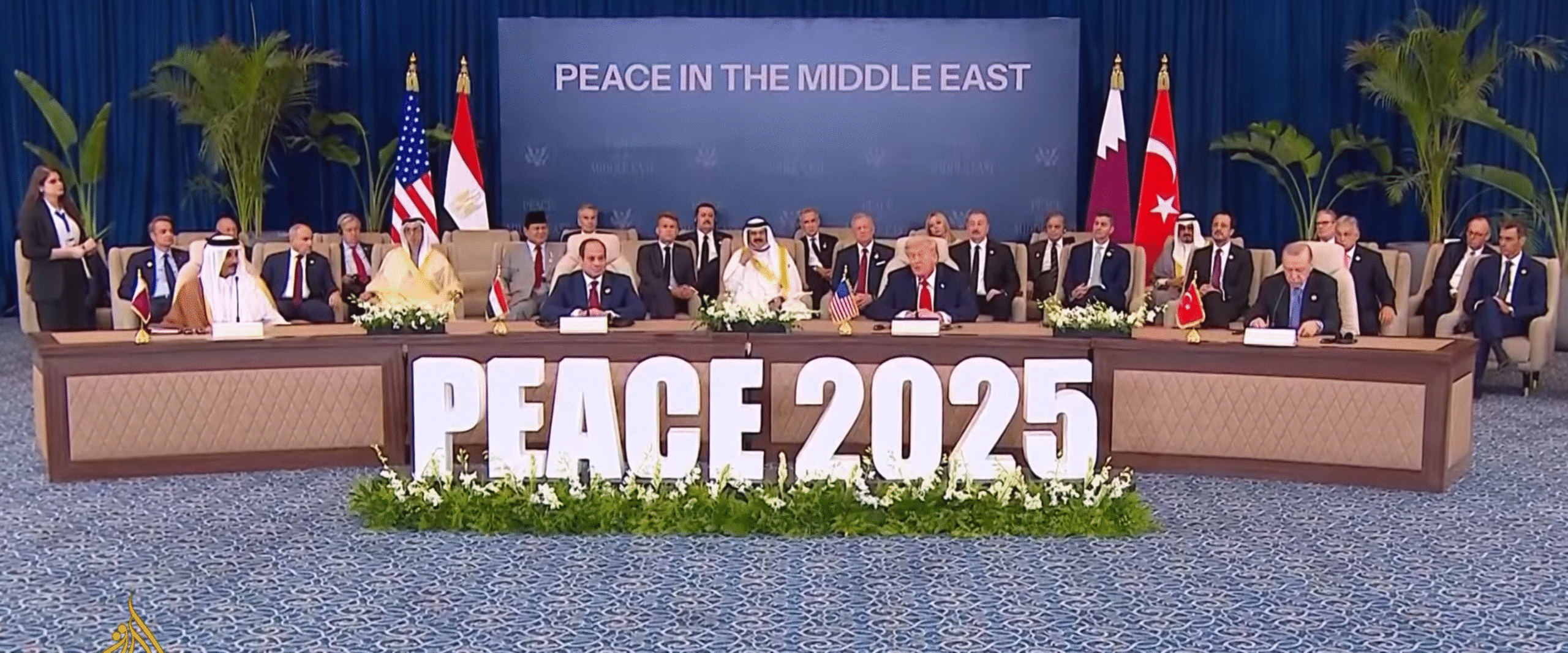3 Narratives News | October 14, 2025
Intro
In a grand hall in Sharm el-Sheikh, Donald Trump, Abdel Fattah el-Sisi, Recep Tayyip Erdoğan, and Qatar’s Emir Tamim bin Hamad Al Thani all raised their pens at once. The signing marked not just a ceremonial act, but a turning point: the first formal peace accord between Gaza, Israel, and regional powers. As Trump pressed ink to paper, he told assembled world leaders and cameras,
“This is the day people across this region and around the world have been working, striving, hoping, and praying for.”
Context
In the seaside resort of Sharm el-Sheikh, the red carpets were rolled, the flags aligned, and a dozen television networks carried what many called “the most consequential signature in decades.”
Today, October 13, 2025, leaders from Egypt, Qatar, Turkey, and the United States gathered to formalize a Gaza peace accord, marking the official end of hostilities between Israel and Hamas.
The accord establishes a permanent ceasefire, a comprehensive prisoner-and-hostage exchange, and a multinational reconstruction fund to rebuild Gaza’s hospitals, schools, and housing. Though Israeli Prime Minister Benjamin Netanyahu declined to attend, citing a Jewish holiday, his government confirmed acceptance of the accord’s conditions. Hamas leaders, similarly absent, issued a statement through Qatari intermediaries confirming compliance “under international guarantee.”
Narrative 1: The Diplomat’s Vision — Trump and the Politics of Redemption
Donald Trump entered the summit hall surrounded by cameras and diplomats. For a man defined by spectacle, this was perhaps the ultimate stage.
“This is a great day for peace,” he told the audience, standing beside Egypt’s President Abdel Fattah el-Sisi, Turkey’s President Recep Tayyip Erdoğan, and Qatar’s Emir Tamim bin Hamad Al Thani. “The holy land deserves quiet, dignity, and life — not endless funerals.”
Trump has spent months courting mediators and travelling across capitals. In his telling, this peace is proof of persistence. “They said it couldn’t be done,” he told reporters, “but I said we’ll make it happen, and now it’s happening. This peace will hold.”
To his supporters, the event revives his image as a dealmaker on the world stage. To his critics, it’s political theatre. But even skeptics concede that a signed ceasefire, verified by Egypt and Qatar, has stopped the bombing.
Narrative 2: The Regional Realists — Hope with Conditions
Regional leaders who sat beside Trump see the accord not as an ending but as a beginning — fragile, conditional, and demanding vigilance.
President Abdel Fattah el-Sisi declared, “The people of Gaza must not live in ruins again. This is a last chance for peace built on justice and rebuilding.” Egyptian security officials confirmed their forces will now oversee border crossings, ensuring aid and reconstruction materials reach Gaza.
Qatar’s Emir Tamim Al Thani, whose envoys brokered months of indirect talks, called the accord “a humanitarian victory, not a political one.”
Turkish President Recep Tayyip Erdoğan was more blunt: “The guns may fall silent today, but peace must be protected tomorrow. We will hold all sides accountable.”
For these leaders, the moment is both symbolic and strategic. Egypt regains diplomatic prestige; Qatar proves its value as a mediator; Turkey positions itself as a regional counterweight to Iran. Yet each knows that without swift reconstruction, Gaza could relapse into chaos.
Narrative 3: The Silent Story — What Comes After the Ink
Beyond the applause and handshakes, the test begins now.
Humanitarian urgency: Gaza’s civilian infrastructure lies in ruins — hospitals collapsed, sanitation destroyed, hundreds of thousands displaced. Aid agencies warn that “peace without rebuilding” will fail within months.
Security architecture: The agreement includes a joint oversight committee of Egypt, Qatar, and the UN to monitor ceasefire violations. Yet, enforcement depends on political will and funding.
Political fatigue: Israelis remain divided. Many families of the 2023 hostages celebrated their loved ones’ return this week; others accuse Netanyahu of capitulation. In Gaza, Palestinians grieve over lost relatives even as they pray the skies stay silent.
Moral gravity: “Peace is not a ceremony,” said UN Secretary-General António Guterres. “It is the daily work of restraint.”
Whether this accord signals transformation or simply respite will depend on how quickly power shifts from politicians to people — from televised diplomacy to the rebuilding of homes, schools, and trust.
Key Takeaways
- A historic peace accord was signed in Egypt by Trump, Sisi, Erdoğan, and Al Thani, marking a formal ceasefire between Israel and Hamas.
- Netanyahu and Hamas were absent but have endorsed the terms via intermediaries.
- The accord includes hostage releases, Israeli troop withdrawal, and a multinational Gaza reconstruction fund.
- Leaders called it the “last chance” for sustainable peace in the region.
- Implementation — not symbolism — will determine success.
Questions This Article Answers
- Who signed the Gaza peace accord, and what are its main terms?
- Why did Israel and Hamas not attend the signing?
- What did Trump, Sisi, Erdoğan, and Al Thani say about the future of peace?
- How will the ceasefire be enforced and monitored?
- What challenges remain for civilians in Gaza and Israel?

[…] had retaken Kabul, and the last American soldiers left the country on August 31, 2021 marking the end of America’s longest war. Pritzker Military Museum; Council on Foreign Relations; Reuters […]
[…] plan as the first real breakthrough. Many of his fiercest critics, including those who demanded an end to the war, voiced relief but stopped short of praise. The war paused, yet the applause never […]
[…] two years ago, a shorter workweek felt like the future. In the UK, fifty-plus firms tested four days on full pay and found what many leaders secretly hoped: less burnout, tighter focus, no collapse in revenue. Microsoft Japan shut the […]